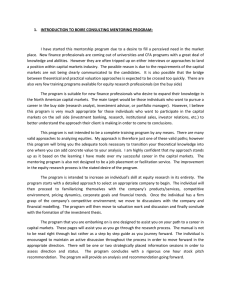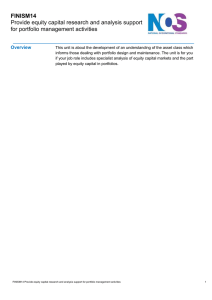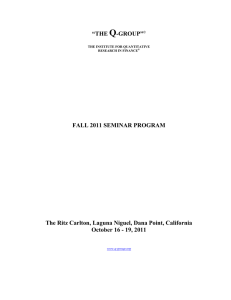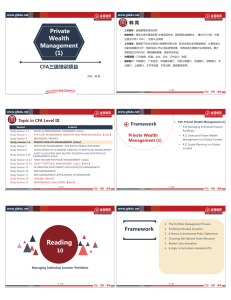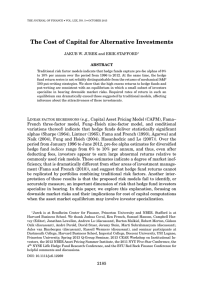MA982 Investment Management
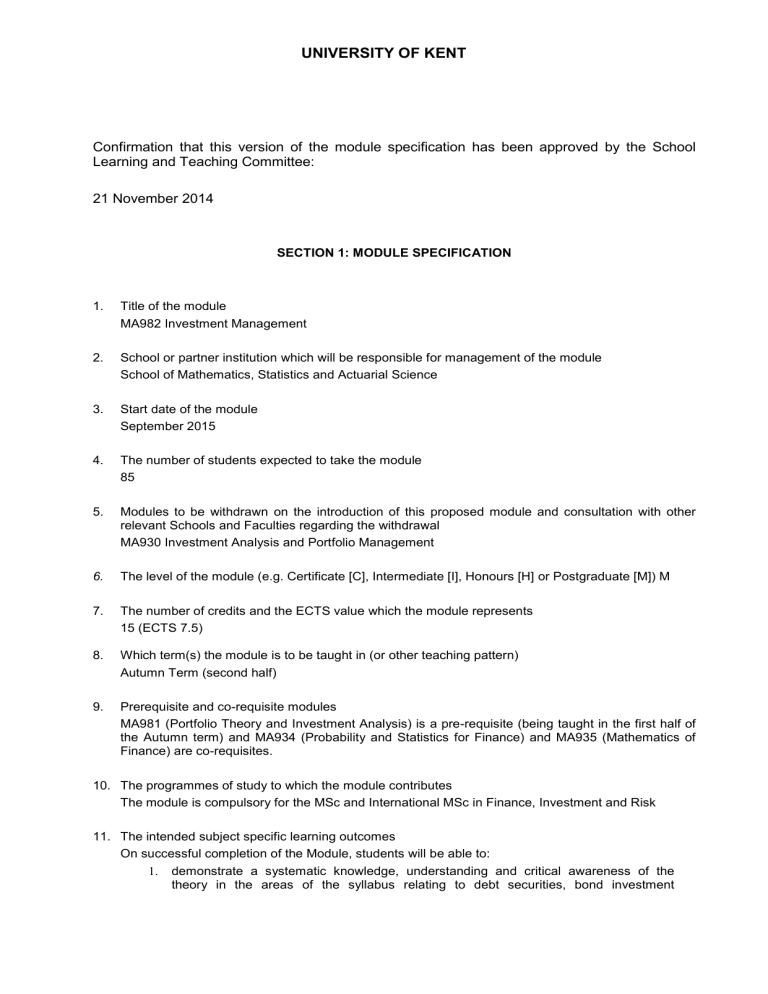
UNIVERSITY OF KENT
Confirmation that this version of the module specification has been approved by the School
Learning and Teaching Committee:
21 November 2014
SECTION 1: MODULE SPECIFICATION
1. Title of the module
MA982 Investment Management
2. School or partner institution which will be responsible for management of the module
School of Mathematics, Statistics and Actuarial Science
3. Start date of the module
September 2015
4. The number of students expected to take the module
85
5. Modules to be withdrawn on the introduction of this proposed module and consultation with other relevant Schools and Faculties regarding the withdrawal
MA930 Investment Analysis and Portfolio Management
6. The level of the module (e.g. Certificate [C], Intermediate [I], Honours [H] or Postgraduate [M]) M
7. The number of credits and the ECTS value which the module represents
15 (ECTS 7.5)
8. Which term(s) the module is to be taught in (or other teaching pattern)
Autumn Term (second half)
9. Prerequisite and co-requisite modules
MA981 (Portfolio Theory and Investment Analysis) is a pre-requisite (being taught in the first half of the Autumn term) and MA934 (Probability and Statistics for Finance) and MA935 (Mathematics of
Finance) are co-requisites.
10. The programmes of study to which the module contributes
The module is compulsory for the MSc and International MSc in Finance, Investment and Risk
11. The intended subject specific learning outcomes
On successful completion of the Module, students will be able to:
1.
demonstrate a systematic knowledge, understanding and critical awareness of the theory in the areas of the syllabus relating to debt securities, bond investment
UNIVERSITY OF KENT strategies, equity analysis, macroeconomic and industry analysis, equity analysis methods, equity portfolio management, hedge funds and performance management;
2.
demonstrate a comprehensive understanding of the complex techniques applicable to solve problems in the areas of the syllabus relating to debt securities, bond investment strategies, equity analysis, macroeconomic and industry analysis, equity analysis methods, equity portfolio management, hedge funds and performance management;
3.
appreciate recent developments and methodologies in investment management and the links between the theory and its practical application and to critically evaluate such methodologies;
4.
demonstrate a comprehensive understanding of the complex current issues relevant to the investment market;
5.
demonstrate an ability to understand, select and apply appropriate methods in portfolio management.
12. The intended generic learning outcomes
On successful completion of the Module, students will have developed:
1.
a logical mathematical approach to solving complex problems;
2.
skills in written communication to both technical and non-technical audiences;
3.
skills in the use of relevant information technology.
13. A synopsis of the curriculum
Overview of the Investment Industry, Characteristics of debt securities and bond investment strategies, Equity analysis; macroeconomic and industry analysis, equity valuation methods, equity portfolio management, Hedge Funds, performance measurement
14. Indicative Reading List
Students should keep up to date with financial markets news and developments by reading the
financial newspapers and periodicals and relevant published reports and periodicals
recommended during the module.
F.K. Reilly and K.C. Brown, Analysis of Investments & Management of Portfolios, 10 th edition,
Cengage Learning
Z. Bodie, A. Kane and A. Marcus, Investments and Portfolio Management, McGraw-Hill
A. Damodaran, Investment valuation: Tools and techniques for determining the value of any asset 2012, Wiley
F. J. Fabozzi, M.J.P. Anson, Fixed Income Analysis , CFA Institute c2007
15. Learning and Teaching Methods, including the nature and number of contact hours and the total study hours which will be expected of students, and how these relate to achievement of the intended module learning outcomes
The module consists of: 36 lectures and example classes
No. of contact hours: 36
Number of independent learning hours:114
Total study hours: 150
The lectures cover the theory and contain worked examples and reference to empirical work and real life case studies to emphasise the practical application of the theory and enable achievement of learning outcomes 11.1-11.5 as outlined in section 11. In example classes, students will practice the application of the theory and work on case studies. Students will also
UNIVERSITY OF KENT use the professional market data platforms to access market data and analytics. Example classes will enable achievement of learning outcomes11.1-11.5 and 12.1-12.3 as outlined in section 11 and 12.
16. Assessment methods and how these relate to testing achievement of the intended module learning outcomes
Assessment: The module is assessed by examination (80%) and by coursework assessment
(20%).
Coursework Assessment : This will consist of two regular open-book written assessments which
are completed by students outside contact hours. These will test all the learning outcomes as
outlined in Sections 11 and 12 and these will also test the higher level techniques of analysis and
critical evaluation listed under the syllabus.
Examination: One 2-hour written examination at the end of the academic year that will consist of questions and numerical problems requiring short and long answers to test the learning outcomes 11.1-11.5 as outlined in Section 11.
17. Implications for learning resources, including staff, library, IT and space
This module replaces one half of MA930. No additional resources are needed.
18. The School recognises and has embedded the expectations of current disability equality legislation, and supports students with a declared disability or special educational need in its teaching. Within this module we will make reasonable adjustments wherever necessary, including additional or substitute materials, teaching modes or assessment methods for students who have declared and discussed their learning support needs. Arrangements for students with declared disabilities will be made on an individual basis, in con sultation with the University’s disability/dyslexia support service, and specialist support will be provided where needed.
19. Campus(es) where module will be delivered: Canterbury





